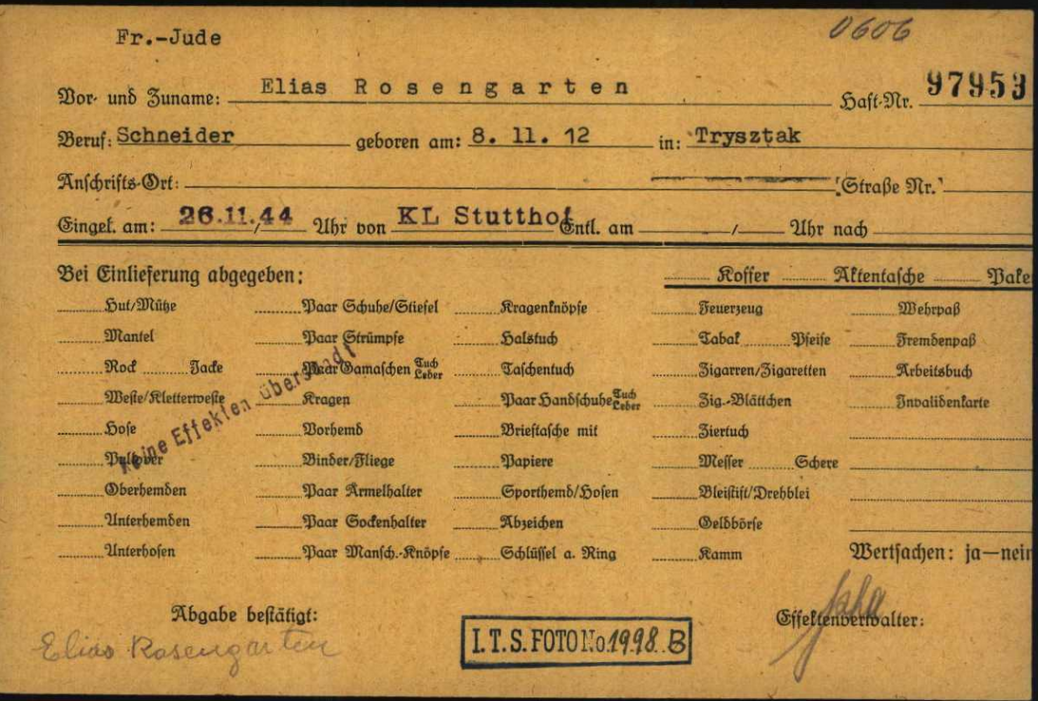Elias ROSENGARTEN
We are three students from the Euro German section of the Louis Armand high school in Mulhouse, in the Alsace department of France. We worked in an Etwinning partnership with some Polish students, during which we came up against a number of obstacles. Despite our best efforts, many aspects of Elias Rosengarten’s life remain shrouded in mystery. All the students were struck by the horror of the Holocaust, the deportations and the uncertainty surrounding Elias Rosengarten’s death. We therefore felt that using a podcast was the best way to approach this biography in a more sensitive manner. Some of the details of our research could not be included in the podcast, but can be found in the list of documents below. A number of questions remain to be answered. We are continuing to ask them, and who knows, maybe we’ll get some answers!
Listen to the podcast in French
Listen to the podcast in German
The text in Polish
Był sobie mężczyzna o imieniu Elias, syn Chaskela i Idessy Rosengarten. Urodził się 8 listopada 1912 roku w miejscowści Frysztak, na terenie Galicji pod zaborem austriackim, dzisiejsza Polska. Elias był Żydem. Był krawcem i opuścił Polskę prawdopodobnie z rodzicami i mieszkał w Luxemburgu. Od września 1939 roku do sierpnia 1940 roku był w Legii Cudzoziemskiej w Bar-le-Duc we Francji. W sierpniu 1942 roku ożenił się z Erną, Esther Parzeczewski. Mieszkali w Villeurbanne niedaleko miejscowości Lyon. W czerwcu 1944 roku Elias został aresztowany przez Gestapo. Został osadzony w więzieniu w Montluc. W lipcu został przeniesiony do Drancy. Został deportowany 1944 roku do niemieckiego nazistowskiego obozu koncentracyjnego i zagłady w Auschwitz. W październku został deportowany do niemieckiego nazistowskiego obozu koncentracyjnego w Stutthof. Miesiąc później do niemieckiego nazistowskiego obozu koncentracyjnego w Buchenwald dokładniej do Berga. Pracował w kopalni.
Cisza…
Czy zmarł z głodu? Czy z powodu choroby? Czy z powodu wyczerpania? Czy został zamordowany? Czy zmarł podczas marszu śmierci?
Cisza…
Jako polityczny zesłaniec został uznany przez rząd francuski za zmarłego w dniu 5 sierpnia 1944 roku.
The text of the podcast in English (translated from the Polish text)
Once upon a time there was a man named Elias. He was the son of Chaskel and Idessa Rosengarten. He was born on November 8, 1912 in the town of Frysztak, in Galicia, which at that time had been annexed by Austria but is now in Poland. Elias was Jewish. He was a tailor and left Poland for Luxembourg, probably together with his parents. From September 1939 to August 1940 he served in the French Foreign Legion in Bar-le-Duc, in the Meuse department of France. In August 1942, he married Erna, Esther Parzeczewski. They lived in Villeurbanne near the town of Lyon in the Rhone department of France. In June 1944, Elias was arrested by the Gestapo and imprisoned in the Fort Montluc jail. In July, he was transferred to Drancy internment camp, from where he was deported to the German Nazi concentration and extermination camp at Auschwitz. In October, he was deported to the German Nazi concentration camp at Stutthof and then a month later to the concentration camp at Buchenwald, or Berga, to be exact, where he worked in a mine.
Silence…
Did he die of starvation? Or from illness? Or from exhaustion? Was he murdered? Did he die during the death march?
Silence…
The French government later declared him to have died on August 5, 1944.
Our research
- We used the records provided by the Convoy77 nonprofit organization
- Documents provided by Victims of Contemporary Conflicts Archives Division of the Ministry of Defense Historical Service, in Caen, France. Dossier reference: AC 21P532800.
This included: - An application for the attribution of the status of political deportee, testimonies related to the police investigation, a marriage certificate and a death certificate.
- From these testimonies we discover that Elias Rosengarten’s widow, Mrs. Esther Parzezewski, was planning to remarry a Mr. Ajzensteurt (?). There is then no further trace of her compensation claim. Did she drop it?
- Records provided by the Arolsen archives: They document and date the transfers, firstly from Auschwitz to Stutthof, then to Buchenwald – Berga.
7-Rosengarten_Elias-documentsbadarolsen65pages
- A list of survivors from Buchanwald concentration camp, on the Arolsen archives website, which clearly states something that is incorrect, in that Elias Rosengarten’s name is included in the list.
- Records provided by Landesarchiv Berlin
This is a claim for compensation by Elias Rosengarten’s parents – who were then living in New York. The claim was rejected, but it contains the story of their flight from Poland to Luxembourg, their deportation and their subsequent escape to the United States. - A French documentary about the Jewish community in Frystak. Polish townspeople recall the Jewish neighbors of their childhood.
VOISINS (François Chilowicz, Anne Bettenfeld & Agata Krolikowska — 2003)
help in understanding the film, A French documentary on the TV channel Arte about the history of anti-Semitism. - A German website on the Berga concentration camp
- An article in French from the Luxembourg archives containing a list of Jews in Luxembourg, trthat was sent to the Gestapo in 1940. Both of Elias Rosengarten’s parents are on the list. A person by the name of Elias Rosengarten is also listed, but with a different date of birth and place of birth from that of our Elias Rosengarten. On the list of deportees from the Rivesaltes camp, there is an Elias Rosengarten with the same date of birth.


 Français
Français Polski
Polski








